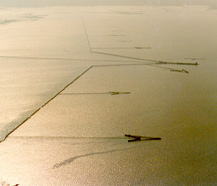 From
the perspective of environmental and development policy and programs, transboundary
resources and transboundary impacts have become an area of increasing concern.
The term 'transboundary'" as it applies to environmental management,
planning and the assessment and monitoring of impacts, refers to resources
and/or impacts that cross over one or more international boundaries. A transboundary
resource or impact is therefore, where two or more countries share, or should
share, responsibility for ownership, management, and exploitation of physical
and biological resources. It includes situations where activities of one
country can directly increase or decrease the quantity, quality or availability
of the same resource in another country.
From
the perspective of environmental and development policy and programs, transboundary
resources and transboundary impacts have become an area of increasing concern.
The term 'transboundary'" as it applies to environmental management,
planning and the assessment and monitoring of impacts, refers to resources
and/or impacts that cross over one or more international boundaries. A transboundary
resource or impact is therefore, where two or more countries share, or should
share, responsibility for ownership, management, and exploitation of physical
and biological resources. It includes situations where activities of one
country can directly increase or decrease the quantity, quality or availability
of the same resource in another country. Water is the most obvious transboundary physical resource in river basins and migratory fish and other aquatic organisms that migrate between two or more countries is a good example of transboundary biological resources. Based on this definition resources and impacts can be classified as to whether or not they are a transboundary resource or transboundary impact. For the Mekong basin area the Mekong River system is the common link.
transboundary impacts are where activities in one country are felt directly in another. Again, the example of water is one of the clearest. An example is that water diversion in the headwaters of the Mekong River causes reductions in water availability and most probably quality downstream.
transboundary effects occur because of the nature of river ecosystems. Water in rivers flows from uplands to lowlands and this physical connectivity within the river environment is utilized by resources and is therefore incorporated within the river's ecosystems. Disturbing these connections to physical and biological transboundary resources will create transboundary impacts.
Both transboundary resources and impacts require international co-operation for their management. As development projects grow in their number and size in the Mekong basin, the transboundary implications of development will become a major issue. This situation has a direct implication for the MRC since it 's cross national mandates will be reflected in the need to address transboundary issues through policy and programs related to the monitoring and management of transboundary resources and impacts.
transboundary effects are not always negative. Countries can benefit each other as well as harm each other. There is much potential for countries to have positive impacts upon natural resources, both for themselves and others, through improved resources management such as river rehabilitation. Some practical examples from fisheries show that there is already a willingness for international cooperation in the Mekong basin.